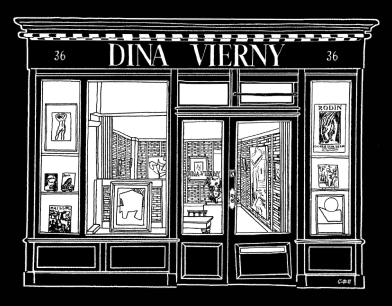

One year after Judit Reigl’s death, Galerie Dina Vierny is pleased to present an exhibition devoted to the artist’s early abstract works. Bringing together key canvases from her best-known series, as well as paintings presented in 1954 at André Breton’s Étoile scellée gallery, the exhibition explores a panorama that is both historical and didactic, in which Reigl’s gesture asserts itself as a witness to her first great years.
“The works in the exhibition Judit Reigl, première abstraction take the viewer on a journey through signs and visual sensations that hark back to the explosion of life itself, while at the same time traversing the artistic debates in Paris from 1954 to 1966. This return to the past invites us to meditate on the series painted by Judit Reigl just after her Surrealist episode: Burst, Center of Dominance, Presence, Guano and Mass Write. The overriding link between all these works is the artist’s body, both instrument and obstacle. The exhibition takes a fresh look at Judit Reigl (a challenge, given the abundance of publications), focusing not on the series, but on the paradigm shift conceptualized in 1962. The paradigm shift, seen here through the prism of the individual, teaches us that when one series ends, another emerges with renewed force.”
(Extract from the text “Judit Reigl, Histories of the Universe” written by Sarah Wilson, art historian and curator, Professor at the Courtauld Institute, London, for the exhibition catalog – available at the gallery).
Judit Reigl is a painter who was by turns surrealist, abstract or figurative. On her arrival in France in 1950, she reunited with her former companion from the Beaux-Arts in Budapest, Simon Hantaï, who introduced her to André Breton. Seduced by her Surrealist canvases, he invited her to exhibit at L’Étoile scellée. She then moved away from Surrealism and produced several series marked by intense gestuality: Éclatements (1955-1958), Centres de dominance (1958-1959) and Écritures en masse (1959-1965). At the same time, unsuccessful canvases were kept on the studio floor, where they were trodden over, covered with pictorial excrement and then reworked: these were the Guano series (1958-1965).
More than the formal elegance of the gesture, it is her authenticity that Judit Reigl seeks. This work culminates in the abstract Déroulements (1973-1985), in which the artist explores an automatic writing style made up of colored tracings emerging transparently on the reverse side of the canvas. Judit Reigl always draws on the most profound experiences of her life to develop a vast and complex reflection on the human being. In search of essence and the absolute, her work is a testimony to the unknown.
Judit Reigl received the Aware Award of Honor in 2017.
Her works are presented in the following museums: MoMA, New York; Guggenheim Museum, New York; The Metropolitan Museum of Art, New York; Centre Pompidou, Paris; Musée d’Art moderne de la ville de Paris; Fondation Dina Vierny – Musée Maillol, Paris; MAC VAL, Vitry-sur-Seine; Musée des Beaux-Arts, Caen; Musée des Beaux-Arts, Grenoble ; Musée Fabre, Montpellier; Musée des Beaux-Arts, Nantes; Arsenal, musée d’art contemporain, Soissons; Albright-Knox Gallery, Buffalo; The Museum of Fine Arts, Houston; Tate Modern, London; The Albertina Museum, Vienna; Hungarian National Gallery, Budapest.














Les membranes vertes de l'espace
1954
Oil on canvas
65 x 94 cm

Sans titre
1954
Oil on canvas
87 x 132 cm

Éclatement
1956
Oil on canvas
141 x 176 cm

Centre de dominance
1958
Oil on canvas
165 x 170 cm

Écriture en masse
1956
Oil on canvas
98 x 119,5 cm

Centre de dominance
1958
Oil on canvas
83 x 90 cm

Écriture en masse
1959
Oil on canvas
105 x 84 cm

Expérience d'apesanteur
1966
Oil on canvas
114 x 87 cm

Guano
1961
Mixed media
31 x 45 cm

Présence
1959
Ink on paper
52 x 44,5 cm

Sans titre
1954
Ink on paper
21 x 28 cm

Sans titre
1954
Ink on paper
21 x 28 cm

Écriture d'après musique
1965
Ink on paper
27 x 21 cm
Aped quas parum qui beaquae preped eum volupitae odis re culpa volor autes nesciis am inus veliquibus. Rum fuga. Et ernam, que minvel Rum fuga. Et ernam, que minvel Rum fuga. Et ernam, que minvel Rum fuga. Et ernam, que minvelEt ernam, que minvel Rum fuga. Et ernam, que minvel Rum fuga. Et ernam, que minvel Rum fuga. Et ernam, que minvel
Aped quas parum qui beaquae preped eum volupitae odis re culpa volor autes nesciis am inus veliquibus. Rum fuga. Et ernam, que minvel Rum fuga. Et ernam, que minvel Rum fuga. Et ernam, que minvel Rum fuga. Et ernam, que minvel Et ernam, que minvel Rum fuga. Et ernam, que minvel Rum fuga. Et ernam, que minvel Rum fuga. Et ernam, que minvel
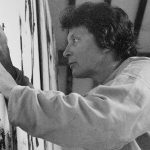
Judit Reigl is a painter who was in turn surreal, abstract or figurative.
After arriving in France in 1950 after eight clandestine attempts to cross the Iron Curtain, Judit Reigl found Simon Hantaï, a fellow student at the Beaux Arts in Bu ...
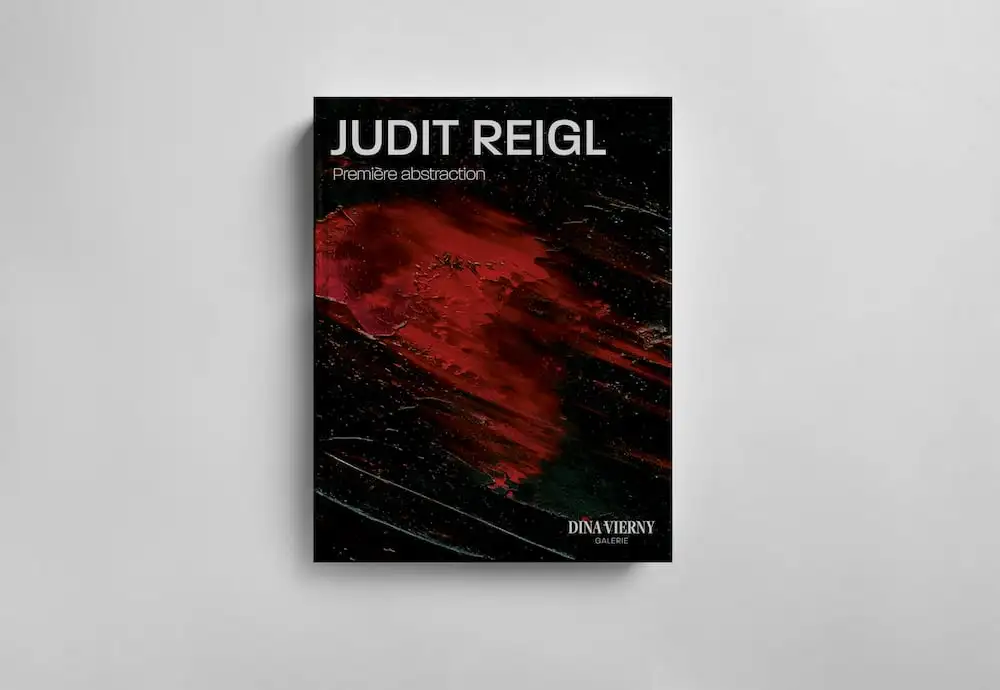
One year after Judit Reigl’s death, Galerie Dina Vierny is pleased to present an exhibition devoted to the artist’s early abstract works. Bringing together key canvases from her best-known series, as well as paintings presented in 1954 at André Breton’s Étoile scellée gallery, the exhibition explores a panorama that is both historical and didactic, in which Reigl’s gesture asserts itself as a witness to her first great years.
“The works in the exhibition Judit Reigl, première abstraction take the viewer on a journey through signs and visual sensations that hark back to the explosion of life itself, while at the same time traversing the artistic debates in Paris from 1954 to 1966. This return to the past invites us to meditate on the series painted by Judit Reigl just after her Surrealist episode: Burst, Center of Dominance, Presence, Guano and Mass Write. The overriding link between all these works is the artist’s body, both instrument and obstacle. The exhibition takes a fresh look at Judit Reigl (a challenge, given the abundance of publications), focusing not on the series, but on the paradigm shift conceptualized in 1962. The paradigm shift, seen here through the prism of the individual, teaches us that when one series ends, another emerges with renewed force.”
(Extract from the text “Judit Reigl, Histories of the Universe” written by Sarah Wilson, art historian and curator, Professor at the Courtauld Institute, London, for the exhibition catalog – available at the gallery).
Judit Reigl is a painter who was by turns surrealist, abstract or figurative. On her arrival in France in 1950, she reunited with her former companion from the Beaux-Arts in Budapest, Simon Hantaï, who introduced her to André Breton. Seduced by her Surrealist canvases, he invited her to exhibit at L’Étoile scellée. She then moved away from Surrealism and produced several series marked by intense gestuality: Éclatements (1955-1958), Centres de dominance (1958-1959) and Écritures en masse (1959-1965). At the same time, unsuccessful canvases were kept on the studio floor, where they were trodden over, covered with pictorial excrement and then reworked: these were the Guano series (1958-1965).
More than the formal elegance of the gesture, it is her authenticity that Judit Reigl seeks. This work culminates in the abstract Déroulements (1973-1985), in which the artist explores an automatic writing style made up of colored tracings emerging transparently on the reverse side of the canvas. Judit Reigl always draws on the most profound experiences of her life to develop a vast and complex reflection on the human being. In search of essence and the absolute, her work is a testimony to the unknown.
Judit Reigl received the Aware Award of Honor in 2017.
Her works are presented in the following museums: MoMA, New York; Guggenheim Museum, New York; The Metropolitan Museum of Art, New York; Centre Pompidou, Paris; Musée d’Art moderne de la ville de Paris; Fondation Dina Vierny – Musée Maillol, Paris; MAC VAL, Vitry-sur-Seine; Musée des Beaux-Arts, Caen; Musée des Beaux-Arts, Grenoble ; Musée Fabre, Montpellier; Musée des Beaux-Arts, Nantes; Arsenal, musée d’art contemporain, Soissons; Albright-Knox Gallery, Buffalo; The Museum of Fine Arts, Houston; Tate Modern, London; The Albertina Museum, Vienna; Hungarian National Gallery, Budapest.

1954
Les membranes vertes de l'espace
1954
Oil on canvas
65 x 94 cm

1954
Sans titre
1954
Oil on canvas
87 x 132 cm

1956
Éclatement
1956
Oil on canvas
141 x 176 cm

1958
Centre de dominance
1958
Oil on canvas
165 x 170 cm

1956
Écriture en masse
1956
Oil on canvas
98 x 119,5 cm

1958
Centre de dominance
1958
Oil on canvas
83 x 90 cm

1959
Écriture en masse
1959
Oil on canvas
105 x 84 cm

1966
Expérience d'apesanteur
1966
Oil on canvas
114 x 87 cm

1961
Guano
1961
Mixed media
31 x 45 cm

1959
Présence
1959
Ink on paper
52 x 44,5 cm

1954
Sans titre
1954
Ink on paper
21 x 28 cm

1954
Sans titre
1954
Ink on paper
21 x 28 cm

1965
Écriture d'après musique
1965
Ink on paper
27 x 21 cm
Aped quas parum qui beaquae preped eum volupitae odis re culpa volor autes nesciis am inus veliquibus. Rum fuga. Et ernam, que minvel Rum fuga. Et ernam, que minvel Rum fuga. Et ernam, que minvel Rum fuga. Et ernam, que minvelEt ernam, que minvel Rum fuga. Et ernam, que minvel Rum fuga. Et ernam, que minvel Rum fuga. Et ernam, que minvel
Aped quas parum qui beaquae preped eum volupitae odis re culpa volor autes nesciis am inus veliquibus. Rum fuga. Et ernam, que minvel Rum fuga. Et ernam, que minvel Rum fuga. Et ernam, que minvel Rum fuga. Et ernam, que minvel Et ernam, que minvel Rum fuga. Et ernam, que minvel Rum fuga. Et ernam, que minvel Rum fuga. Et ernam, que minvel

Judit Reigl is a painter who was in turn surreal, abstract or figurative.
After arriving in France in 1950 after eight clandestine attempts to cross the Iron Curtain, Judit Reigl found Simon Hantaï, a fellow student at the Beaux Arts in Budapest, in Paris. The latter introduced her to André Breton in 1954 who, seduced by her surrealist paintings, invited her to exhibit at L’Étoile scellée.
She then moved away from surrealism...
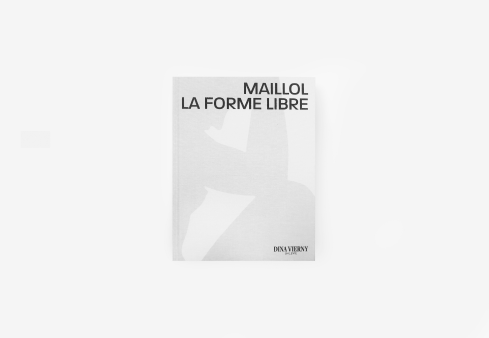
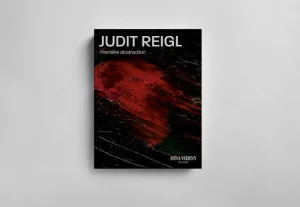



Newsletter





Galerie Dina Vierny
36 rue Jacob 75006 Paris
Open from Tuesday to Saturday from 10 a.m. to 7 p.m.
Galerie Dina Vierny
36 rue Jacob 75006 Paris
Open from Tuesday to Saturday from 10 a.m. to 7 p.m.
